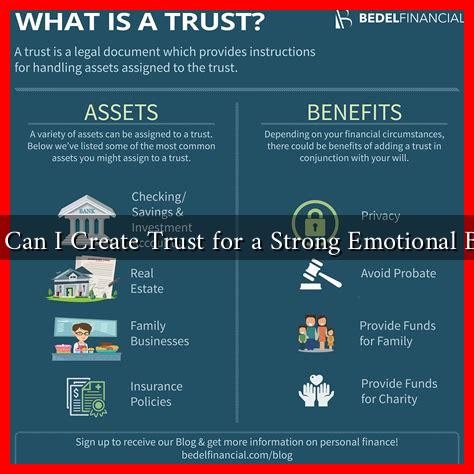-
Table of Contents
How Can I Create Trust for a Strong Emotional Bond?
Building trust is a fundamental aspect of creating strong emotional bonds in any relationship, whether personal or professional. Trust acts as the foundation upon which relationships are built, allowing individuals to feel secure, valued, and understood. In this article, we will explore effective strategies for fostering trust and emotional connections, supported by research and real-life examples.
The Importance of Trust in Relationships
Trust is not just a nice-to-have; it is essential for healthy relationships. According to a study published in the journal *Personal Relationships*, trust significantly influences relationship satisfaction and stability. When trust is present, individuals are more likely to communicate openly, resolve conflicts effectively, and support each other emotionally.
Key Strategies to Build Trust
Creating trust requires intentional effort and consistent behavior. Here are some effective strategies to help you build trust and strengthen emotional bonds:
- Be Honest and Transparent: Honesty is the cornerstone of trust. Share your thoughts and feelings openly, and avoid hiding information. Transparency fosters a sense of security and encourages others to reciprocate.
- Show Consistency: Consistency in your actions and words reinforces reliability. When people know what to expect from you, they are more likely to trust you. For example, if you commit to being there for someone, follow through on that promise.
- Practice Active Listening: Listening is a powerful tool for building trust. When you actively listen, you show that you value the other person’s perspective. This can be achieved by maintaining eye contact, nodding, and summarizing what the other person has said.
- Be Vulnerable: Sharing your own fears, insecurities, and experiences can create a deeper emotional connection. Vulnerability encourages others to open up and fosters mutual trust.
- Respect Boundaries: Everyone has personal boundaries that should be respected. Acknowledging and honoring these boundaries demonstrates that you value the other person’s feelings and autonomy.
Real-Life Examples of Trust Building
To illustrate the effectiveness of these strategies, consider the following examples:
- Case Study: Couples Therapy – In couples therapy, therapists often emphasize the importance of trust-building exercises. One common exercise involves sharing personal stories and vulnerabilities, which helps partners understand each other better and fosters emotional intimacy.
- Corporate Trust Initiatives – Companies like Google have implemented trust-building initiatives within their teams. By encouraging open communication and feedback, they have seen increased employee satisfaction and collaboration, leading to higher productivity.
Statistics on Trust and Relationships
Research highlights the significance of trust in relationships:
- A survey by the American Psychological Association found that 70% of individuals believe trust is the most important factor in a successful relationship.
- According to a study published in the *Journal of Social and Personal Relationships*, couples who reported high levels of trust also reported greater relationship satisfaction and lower levels of conflict.
Overcoming Trust Issues
Building trust can be challenging, especially if past experiences have led to trust issues. Here are some tips for overcoming these obstacles:
- Identify Triggers: Recognize what specific behaviors or situations trigger your trust issues. Understanding these triggers can help you address them more effectively.
- Communicate Openly: Discuss your trust issues with the person involved. Open communication can help clarify misunderstandings and rebuild trust.
- Seek Professional Help: If trust issues persist, consider seeking help from a therapist or counselor who specializes in relationship dynamics.
Conclusion
Creating trust is a vital step in establishing strong emotional bonds. By being honest, consistent, and vulnerable, you can foster an environment where trust can flourish. Remember that building trust takes time and effort, but the rewards—deeper connections, improved communication, and greater relationship satisfaction—are well worth it. As you implement these strategies, you will not only enhance your relationships but also contribute to a more trusting and supportive community.
For further reading on building trust in relationships, consider exploring resources from the American Psychological Association.


